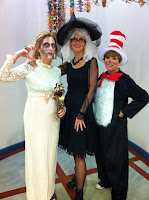Today started out just like every other ordinary day until I looked at my Prep email. What I call ordinary quickly changed. Our job as librarians can be extraordinary; we can be called friend.
Our very own alumni author and columnist,
Emily Ansara Baines '03 (
The Unofficial Hunger Games Cookbook,
The Unofficial Downton Abbey Cookbook) sent the following along this morning. With her permission, it is reposted here:
enjoy!
-Mrs. Ursettie
Libraries Are My Safe Place (Or, How I Learned to Wave My Freak Flag)
I was a weird kid.
Granted, most of us after the age of 25 look back on our high school years and label ourselves “weird.” With vocalized self-reflection comes the mass realization that no one during those painful adolescent years considered themselves “normal.” Perhaps that’s why teens are so mean to one another—they’re all trying to fit in and hide their oddities. Only with age do we realize that all of us are freaks.
I waved my Freak Flag too proudly for an eighth-grader hoping to survive unscathed. Long black velvet skirts, hair shorter than a boys, dark eyeliner, large big-rimmed hats a la Audrey Hepburn in
My Fair Lady — I wasn’t “goth,” but I definitely wasn’t like the rest of the girls shopping at Delia’s and Limited Too.
I also had a hard time making friends. My desperation for companionship permeated out of me like condensation on a coke can during a warm summer’s day. I was desperate for friendship. And that anxiety made me a far from attractive friend.
A specific example comes to mind. At lunch one day, I sat near – but not at – the “cool kids” table. Over peanut butter and jelly sandwiches they discussed the movie
Titanic with a weightiness that even Roger and Ebert didn’t dare. It was no longer seventh grade —
Titanic had stopped being cool. Leo was “out.” A film nerd along with a book nerd, I thought I might have an opinion worth hearing.
“I liked the editing,” I spoke up, frowning as my voice cracked. My cheeks burned with embarrassment—and also hope. Maybe they would listen. Maybe this was my way to prove I had opinions worth sharing.
The kids looked at me, then turned back to one another. They didn’t even bother to snicker. Instead, they continued their discussion as if I hadn’t spoken at all.
I turned to the library.
I was never very confident when it came to talking to my peers, but I loved talking to adults. With adults, there was less subterfuge: communication was less of a game where I didn’t know the rules. I said what I meant and they weren’t offended. We could have a conversation about a book without some other kid in my class falsely hearing I bad-talked her behind her back.
And so, that’s what I did. Every day during nutrition break and lunch I would visit school librarians Mrs. Hodge and Mrs. Ursettie. After they kindly reminded me I wasn’t allowed to bring Diet Coke into the library, we would discuss our weekends. I’d tell them my most private hopes and fears. Unlike my fellow students, they listened to my review of
Titanic with nods of the head, adding their own opinions, and even recommended some books on filmmaking.
The librarians were my first editors. Their constructive criticism always came with a healthy dose of encouragement. And, of course, we would recommend books to each other. Other than Mrs. Leidenthal,
whom I’ve written about before on Read It Forward, the librarians were my first real friends at Flintridge Prep. In a setting fraught with emotional peril, they made me feel safe.
Recently, I’ve been lucky enough to substitute teach at my old high school. This has given me a perspective on my educational experience that I don’t think I would have otherwise attained. Once viewing the school through the eyes of a student, I now look at it as a teacher.
While Flintridge Preparatory has changed a great deal since I last attended – including an impressive library renovation – what made that library great has remained: Mrs. Ursettie and Mrs. Hodge (a new employee, Mrs. Eldridge, is also fantastic and kind). If anything, the librarians are even more involved in the day-to-day activities of the school. Classes take place in the computer lab on the second floor of the library, and research projects require students to discuss different research methods with the librarians.
And, of course, there’s always the student or two who reminds me of myself at a young age. She (or he) comes in more than the other students. She doesn’t always want help with homework. Sometimes she just wants to talk. Sometimes she just wants company; or for someone older and possibly wiser to listen to and validate her opinions.
Going to the school library at Flintridge Prep is like going to therapy, but without the supposed stigma of being sent to the doctor’s office. At the library, students—readers and non-readers alike—can be heard.
[Photo Credit: 501Room / Shutterstock.com]
Do you love your local library? Tell us why in the comments!
About the Author
EMILY ANSARA BAINES is the author of
The Unofficial Hunger Games Cookbook and
The Unofficial Downton Abbey Cookbook. Her short stories have appeared in Narrative literary magazine and AngeLingo. She graduated with honors from USC, where she studied creative writing under Aimee Bender and T.C. Boyle. One day Emily will live in Paris and speak French while wearing a beret, but these days she makes do with hiding out in the bookstores of Los Angeles. Her favorite word is murmur. Visit Emily online on Twitter
@LiteraryQueen.






 The Lion, the Witch, & The Wardrobe, 2012
The Lion, the Witch, & The Wardrobe, 2012


































